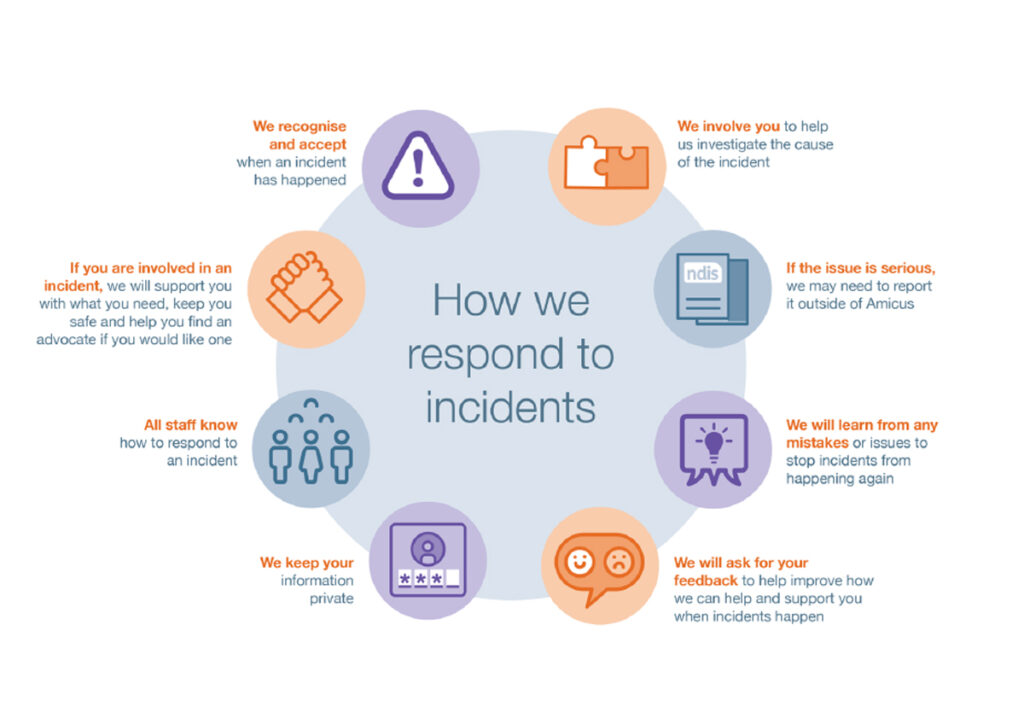Incident management
Amicus values the role every person in our organisation plays in meeting our responsibility to deliver on safety and service excellence. Amicus is committed to providing a safe environment for participants across all service provision, including actively working towards the prevention of violence, abuse, neglect, exploitation and discrimination.
Participant incidents include all incidents disclosed to, or observed by, a service provider at any service delivery setting (for example, provider premises, participant’s home, whilst in the community).

How we manage incidents

Respond
Protect the health and safety of the Participant, the health and safety of others including our staff, and take emergency action if required.
Whilst being respectful and sensitive to the way in which you may respond to the experience of the incident, Amicus staff are responsible to the immediate response to the incident, including;
- ensuring the immediate safety, health and wellbeing of the participant and other involved parties
- obtaining medical attention if required
- notifying VIC POL and other emergency services as appropriate
- linking to the advocate (where you would like one)
- contact with key stakeholders, with consent, both internal or external
- documenting actions undertaken and planned actions in the response to the participant incident
- preserving evidence
- accessing specialist victim and support services as required
- taking any remedial action necessary to re-establish a safe environment.
Report
Anyone can report an incident.
An incident should be reported ASAP. All incidents must be reported to the person responsible (the Incidents, Complaints and Investigations Officer (ICIO)) within 24 hours of occurring, preferably as soon as it’s safe to do so. The ICIO will make sure all relevant personnel are notified on receipt of the incident information.
Assess
Assess all incidents
- Could it have been prevented?
- Why it occurred?
- How well it was managed and resolved?
- Future prevention measures – risk management strategy etc.
Notify
Who? When? Why?
This includes Department of Families, Fairness and Housing, NDIS Quality and Safeguard Commission, Victoria Police, Child Protection, Commissioner for Children and Young People, other stakeholders (inclusive of other providers, formal and informal supports, and where there is a collaboration agreement in place).
Analyse
Review the information we have, and find out what we don’t know.
At times we might need to obtain further information about the incident and undertake an internal (or external) investgiation in such cases where the cause of the incident is unknown, or the nature and impact (or potential impact) of the incident is significant.
Consult
With you. With relevant regulatory bodies. With other internal and external stakeholders.
With your consent we will talk your incident through with the other people in your life, to be collaborative and responsive, and to supporting any possible learnings
*Where necessary, Amicus will share information if required by law, or to lessen or prevent serious risk to the wellbeing of a participant, or others. Additionally as a registered provider, Amicus is responsible for reporting certain incidents to the relevant authority as required.
Learn
Identify trends, develop and complete correction actions, improve our services.
Amicus commits to reflecting on every incident that occurs, to learn from what has happened, to improve quality of service provision, and to prevent the incident from occurring again. This includes maintaining a participant incident register, to identify and reflect on trends.
Privacy and confidentiality
Amicus recognises that each person we support has the right to privacy, dignity, and confidentiality in all aspects of their lives. Amicus ensures that all support provided to the person is respectful, professional and endorses and maintains their right to privacy, dignity, and confidentiality at all times. Amicus ensures that all people are aware of and fulfil their obligations under the relevant legislation governing privacy, dignity, and confidentiality. This includes all dealings with prospective, current and past people whom we support.
Access to all incident records is limited to appropriate Amicus representatives, who have a business purpose for doing so i.e. are supporting the post incident response.
Quick Links
Factsheet 1 – staff incident response
Factsheet 2 – supervisor incident response
Factsheet 3 – participant incident information
Amicus rights and responsibilities brochure
NDIS Fact Sheet for Participants: What happens when a provider reports an incident?
NDIS Commission Speak Up: How to make a complaint about your NDIS service
